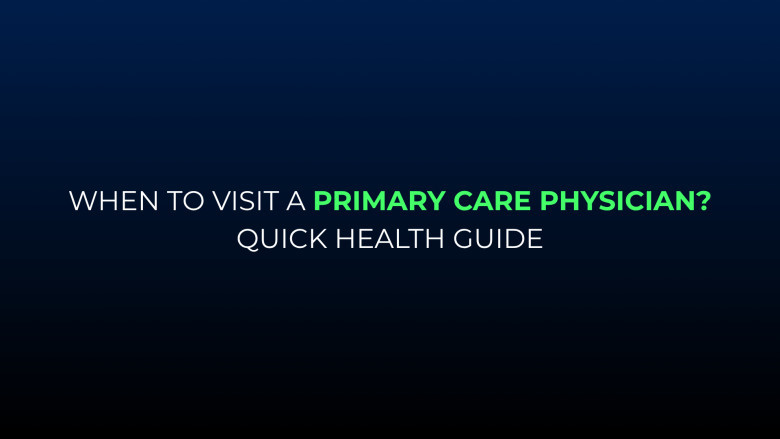views

Choosing when to visit a primary care physician is an essential decision for your health. Whether you’re new to an area or simply unsure of when to make an appointment, knowing when to see a doctor can save you time, money, and even your health. This guide will explain the best times to visit your primary care physician in Hamilton, NJ and why having a regular doctor is crucial for your well-being.
What is a Primary Care Physician?
A primary care physician is a doctor who focuses on overall health care for people of all ages. They’re the ones you see for routine check-ups, health screenings, preventive care, and when you’re not feeling well. They often manage your long-term health needs, coordinating care and referring you to specialists when needed.
Having a primary care physician ensures that you have someone who understands your medical history and can provide consistent care, whether it’s for an illness, injury, or preventive health check.
Regular Check-ups and Preventive Care
One of the primary reasons to see a primary care doctor is for routine health check-ups. Regular visits to your primary care physician help catch any health problems early, often before symptoms even appear. This is particularly important for conditions like diabetes, hypertension, and high cholesterol, which can often go unnoticed without routine testing.
During these visits, your physician will conduct health screenings, provide vaccinations, and offer guidance on lifestyle changes, diet, and exercise to keep you healthy. The goal is to prevent health problems from developing, rather than just treating them after they arise.
When You’re Feeling Unwell
If you're feeling sick or have symptoms of an illness, your primary care physician is the first person you should contact. Whether it's a cold, flu, stomach bug, or a more serious concern, your doctor can help determine the cause of your symptoms and provide the necessary treatment or guidance. They can also help you manage conditions like asthma, allergies, and infections.
Your primary care doctor will be able to provide you with the right medications, advice on home care, or recommend any tests or specialist care if needed.
Chronic Condition Management
If you have a chronic condition like diabetes, heart disease, or arthritis, your primary care physician is your go-to doctor for regular management. Chronic conditions often require continuous monitoring, lifestyle adjustments, and medication. Regular visits to your doctor ensure that your condition is well-managed and that any complications are caught early.
A primary care physician will work with you to create a personalized plan to manage your chronic conditions. They can also refer you to specialists if necessary to help with specific aspects of your care, such as a cardiologist for heart disease or an endocrinologist for diabetes.
Preventive Screenings and Vaccinations
Another important reason to see your primary care physician is for preventive screenings and vaccinations. These are designed to catch health issues early and to prevent serious illnesses. Depending on your age, gender, and family history, your doctor may recommend specific tests or vaccinations.
Some common screenings include:
· Blood pressure checks
· Cholesterol testing
· Diabetes screenings
· Cancer screenings (such as mammograms, colonoscopies, and skin exams)
· Vaccinations (flu shots, tetanus boosters, etc.)
Your primary care doctor will help keep track of your health screenings and ensure that you’re up-to-date on all necessary vaccinations.
When You Need a Referral to a Specialist
If your primary care doctor suspects that you may need specialized care, they can provide a referral to the appropriate specialist. This could include seeing a cardiologist for heart-related issues, a gastroenterologist for digestive problems, or a neurologist for neurological conditions.
Having a primary care physician means that you have someone who understands your health and can coordinate care with other specialists. They can make sure that you’re referred to the right specialist at the right time and help manage your overall treatment plan.
Urgent Health Concerns
Sometimes, health problems arise that need immediate attention but aren’t emergencies. A primary care doctor Hamilton Township can address urgent concerns such as a minor injury, an infection, or a sudden illness. If you’re unsure whether to go to the emergency room, your primary care physician can often provide the care you need or direct you to urgent care.
In areas like Mercer County, which includes towns like East Windsor Township, Ewing Township, and Hightstown Borough, having a local primary care physician means you don’t have to waste time deciding where to go for non-emergency medical needs. You can visit your doctor’s office or even be referred to a local urgent care center, depending on the situation.
Maintaining Long-Term Health
Seeing your primary care physician regularly isn’t just about treating illness or injury. It’s also about maintaining your long-term health and preventing future problems. A primary care doctor provides you with the knowledge and resources to make healthier decisions every day. They can guide you on topics like:
· Healthy eating and weight management
· Exercise routines that suit your lifestyle
· Stress management
· Sleep hygiene
· Substance use and addiction support
By working closely with your primary care physician, you can ensure that your health stays on track throughout the years.
What If I Don’t Have a Primary Care Physician?
If you don’t already have a primary care physician, it’s important to find one. Not having a dedicated doctor means that you may miss out on preventive care, regular check-ups, and timely treatment for illnesses. You may also end up going to urgent care or emergency rooms when you don’t need to, which can lead to longer wait times and higher costs.
To find the right primary care doctor for you, consider factors like location, office hours, patient reviews, and the types of services offered. If you live in Princeton, Robbinsville Township, or Trenton, make sure to look for a doctor who is conveniently located and offers the care that fits your needs.
Your Local Medical Clinic in Hamilton Township, New Jersey
If you live in Mercer County, finding a reliable medical clinic in Hamilton Township, New Jersey means you’ll have easy access to the care you need. Having a local medical office close to home can save you time and ensure you have quick access to a doctor who understands your health needs.
The clinic will be equipped to offer both routine and urgent care services. Whether you need a wellness check, help managing a chronic condition, or treatment for an illness, your primary care physician can provide you with the best options. Plus, they can offer referrals to specialists when necessary, ensuring that you receive comprehensive care.
When to Visit the Emergency Room Instead
While your primary care physician is there for you for most health needs, there are times when you should go straight to the emergency room. If you experience symptoms like chest pain, severe shortness of breath, or sudden, intense pain, you should call 911 or go to the ER immediately.
Your primary care doctor can help you understand when it’s appropriate to go to the ER and when you can wait for a regular appointment. Knowing the difference can help you avoid unnecessary ER visits and reduce the pressure on emergency services.
Conclusion
Knowing when to see a primary care physician is essential to maintaining your health. Whether it’s for regular check-ups, chronic condition management, or urgent care, your primary care physician in Hamilton, NJ is there to guide you every step of the way. Don’t wait until you’re sick to make an appointment. Establishing a relationship with your primary care doctor today can lead to better health outcomes tomorrow.
If you live in East Windsor Township, Lawrence Township, or any other part of Mercer County, it’s easy to find a medical clinic in Hamilton Township, New Jersey that fits your needs. Regular visits to your primary care physician can make all the difference in your health and overall well-being.













Comments
0 comment